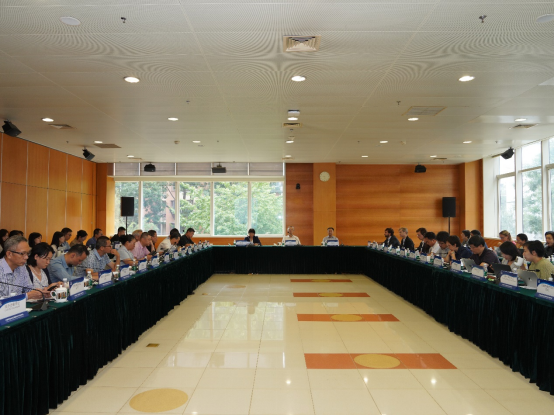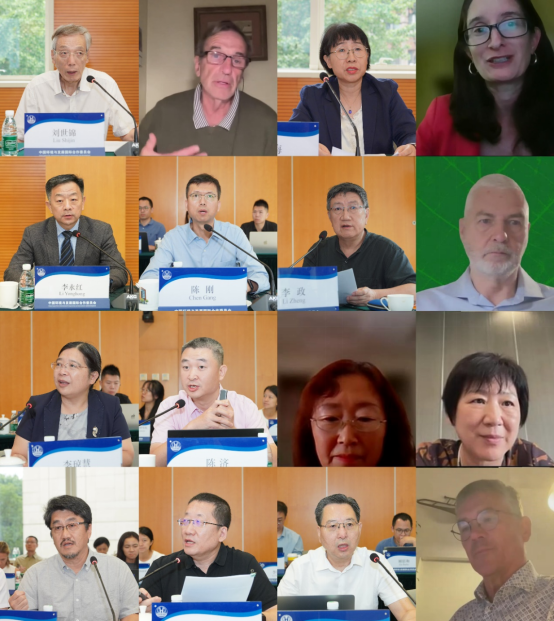2025-09-10Source: CCICED
The 3rd Chief Advisors-Secretariat Joint Working Meeting of the China Council for International Cooperation on Environment and Development (CCICED) of 2025 was held in Beijing on September 5 in a hybrid format. The meeting included presentations on policy studies covering a range of topics, provided updates on the interim findings of ongoing research projects, and reported on the preparations for the 2025 Annual General Meeting.
Liu Shijin and Scott Vaughan, CCICED Chief Advisors, Zhou Guomei, CCICED Deputy Secretary-General and Director-General of the Department of International Cooperation of the Ministry of Ecology and Environment of China, and Lana Edwards, CCICED Special Advisor, Director General of Bilateral Affairs and Trade of Environment and Climate Change Canada, delivered remarks at the meeting. Li Yonghong, CCICED Deputy Secretary-General and Director-General of the Foreign Environmental Cooperation Center of the Ministry of Ecology and Environment, attended the meeting.

In his speech, Liu Shijin emphasized that despite external challenges such as anti-globalization and protectionist tendencies in the current global green transition, the path of green and low-carbon development remains an irreversible global trend and should be pursued with unwavering commitment. The challenges and problems encountered during the transition are fundamentally temporary phenomena inherent to the development trajectory and should be resolved through sustained technological innovation and institutional reform. The research conducted by the CCICED is guided by these core principles, with the objective of demonstrating firm confidence in the transformation process and delivering innovative, actionable solutions.
Scott Vaughan noted that this meeting represents the final Chief Advisors-Secretariat Joint Working Meeting prior to the 2025 Annual Meeting of the Council. It is intended to consolidate and summarize the core research findings and policy recommendations from each team, as well as to lay the groundwork for the Annual General Meeting to be held in Beijing in October. The research conducted by experts from China and abroad in key areas such as climate change mitigation, biodiversity conservation, sustainable marine development, and international cooperation on green development highlights the systematic nature of the CCICED's research framework and the significance of cross-sectoral collaboration. The CCICED will consolidate recommendations from all stakeholders and seek broad input to develop its annual policy recommendations. He looks forward to continuing to work closely with all sides to ensure the successful implementation of the Annual General Meeting and the achievement of substantive outcomes.
Zhou Guomei stated that the President Xi Jinping proposed the Global Governance Initiative at the "Shanghai Cooperation Organization (SCO) Plus" Meeting, staying committed to the core principles of "sovereign equality, international rule of law, multilateralism, people-centered approach, and real results." This represents China's fourth global public good, following the Global Development Initiative, the Global Security Initiative, and the Global Civilization Initiative, and it provides strategic guidance for global environmental governance and the CCICED's work. Moving forward, the CCICED will prioritize high-quality policy research, promote high-level dissemination and sharing of research outcomes, and formulate next year's work plan from an advanced starting point, with the objective of offering policy recommendations for the formulation of China's 15th Five-Year Plan and the successful hosting of COP30.
Lana Edwards notes that in the context of global instability, fostering mutual trust has become increasingly challenging. In the process of preparing for COP30, in addition to setting an ambitious carbon reduction target for 2035, it is equally critical to develop a robust and forward-looking climate adaptation strategy. All related work should be grounded in robust scientific evidence and comprehensive empirical data. The research findings of the CCICED and its policy recommendations are expected to contribute to the realization of more ambitious objectives and provide substantial support for China's path toward a prosperous and sustainable future. As a long-standing partner of the CCICED, Canada will continue to collaborate with China and the European Union to promote high-level climate action dialogue and will work in concert with all partners to expedite global climate action.

Representatives and experts from the High-Level Task Force on "China's Environment and Development Outlook," as well as the eight Special Policy Studies under the CCICED 2024–2025 research year — including "Global Climate Governance and Green and Inclusive Transition," "Governance System for a Harmonious Coexistence between Humans and Nature," "Major Scientific and Technological Innovation in Green Transition," "Green Finance for Comprehensive Green Transformation of the Society and Economy," "Sustainable Blue Economy under the Vision of Carbon Neutrality," "Promoting High-Quality Development with Circular Economy," "Low-Carbon Transition Pathways in Traditional Energy Regions," and "Green Development Cooperation" — along with the Scoping Studies on "Collaborative Innovation in Energy and Environment for High-Quality Development" and "Climate Adaptation," presented their project research findings and preliminary policy recommendations.
Nearly 100 representatives from CCICED Members, Special Advisors, Partners, experts from research teams, the CCICED Secretariat and the Secretariat International Support Office participated in the meeting.
Contact Us:
E-mail:secretariat@cciced.net
Address:5 Houyingfang Hutong,Xicheng District,Beijing 100035 P.R.Chinazip code:100035
Copyright © 2020 Secretariat of China Council for International Cooperation on Environment and Development. All Rights Reserved. Presented by China Daily.
